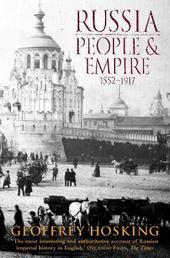
|
Russia: People and Empire: 1552-1917
Paperback / softback
Main Details
| Title |
Russia: People and Empire: 1552-1917
|
| Authors and Contributors |
By (author) Geoffrey Hosking
|
| Physical Properties |
| Format:Paperback / softback | | Pages:576 | | Dimensions(mm): Height 198,Width 129 |
|
| Category/Genre | British and Irish History |
|---|
| ISBN/Barcode |
9780006383727
|
| Classifications | Dewey:947 |
|---|
| Audience | |
|---|
| Illustrations |
Index
|
|
Publishing Details |
| Publisher |
HarperCollins Publishers
|
| Imprint |
Fontana Press
|
| Publication Date |
16 March 1998 |
| Publication Country |
United Kingdom
|
Description
Geoffrey Hosking's study provides a prism through which to view Russian history by posing the apparently simple question: what is Russia's national identity? His thesis is that the needs of Russia's empire prevented the creation of a Russian nation. The Tsars, and before them the Grand Dukes of Moscow, were empire builders rather than nation builders and, as consequence, profoundly alienated ordinary Russians.
Author Biography
Geoffrey Hosking has been Professor of Russian History at the School of Slavonic Studies, University of London, since 1984. He is the author of the award-winning History of the Soviet Union for Fontana Press. In 1988, Professor Hosking was invited to give the annual BBC Reith lectures and spoke on the subject of 'Change in Contemporary Soviet Society', in doing so accurately predicting the imminent collapse of the Soviet Union.
Reviews'Hosking's book is a tour de force of historical argument, vividly written courageously argumentative' Michael Ignatieff, Observer 'Brilliant...an elegantly written, humane and rigorous work of empirical history.' Michael Burleigh, Independent on Sunday 'Russia: People and Empire is the most interesting and authoritative account of Russian imperial history in English. It is a masterful synthesis, intelligent and lucid, passionately argumentative, but always fair, which should be read by everyone who wants to understand the origins of Russia's predicament today.' Orlando Figes, The Times
|